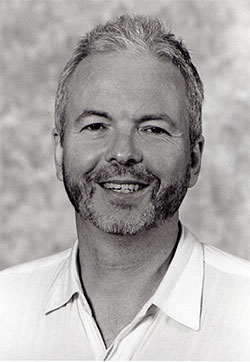An Englishman in New York
As a young boy, John Broughton lived in a little village 15 miles south of London; that, he recalls, "had no cinema." Yet, his parents were the organizers of a community film society in that village and, as a result he says, "I grew up as a Cinema Paradiso projector boy."
Broughton has continued his love affair with film throughout his career, initially using his encyclopedic knowledge of the medium to explore the historic and philosophical aspects of psychology. "I illustrated theory by pulling out pungent and poignant scenes from well-known films," he says, noting that while students often are already familiar with these movies, calling their attention to theory "gives them a much deeper and different sense of what's taking place on screen."
When you use entertainment, the battle is half won, everyone is attentive and everyone is interested," Broughton says. "What they don't really expect is how the experience becomes very hard work as you start to give an academic analysis."
As highly active media consumers, young people, are extremely knowledgeable about the media, to the point of being "theoreticians in their own right," says Broughton, who wrote his dissertation on "Adolescent Philosophies of Life."
"The change for me was when I became impressed with how central culture is to their capacity to theorize experience," Broughton explains. "Psychology has only a limited repertoire to capture that role of culture."
When TC underwent a departmental reorganization about 10 years ago, Broughton moved into the Department of Arts and Humanities. Because of the range of interests of the students in the Department, his classroom techniques expanded to the use of music, advertising, magazines, video games, television shows, and the Internet. He currently teaches courses that explore cultural studies, media and visual culture, youth culture, popular culture, and gender and violence.
Why violence? In addition to studying psychology -- as well as molecular biology and physiology during four years of medical school - Broughton also was strongly influenced by his six years of Reserve Officers' Training Corps in the UK. He is an expert on explosives and hand grenades. His interest in military aspects of culture led him to write a media analysis of the first Gulf War.
"I was interested in how central graphic imagery was to justifying that war, particularly video images from smart bombs," he says. In fact, the cameras on these bombs have no role in targeting - that's accomplished by laser beams. They exist solely to fascinate a domestic television audience. "I think it is interesting how much thematic elements of the culture have to be orchestrated to organize a modern country to war," Broughton says.
Broughton's enthusiasm for cultural studies sparked the interest of several of his current and former students who recently organized the first-ever national conference on Cultural Studies and Education, here at TC. The conference brought together students and scholars, both from across and outside the College, to explore the roots of cultural studies in education and its usefulness to educators.
Ultimately, Broughton believes cultural studies are an important aspect in studying young people and their world - particularly "to understand the way in which fiction and fantasy are formative in their lives and in the changing society that they are encountering."
"There is an interesting debate within cultural studies about whether youth are shepherded around by clever marketing experts or are, themselves, the creative inventors of new sub-cultural forms," he says. "Young people are very quick to distinguish between genuinely innovative cultural forms and mere marketing devices."
Broughton talks more about his interest in cultural studies in a video interview with Professor Renee Cherow-O'Leary on Peer Review.
Published Tuesday, Aug. 23, 2005
